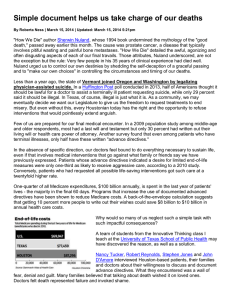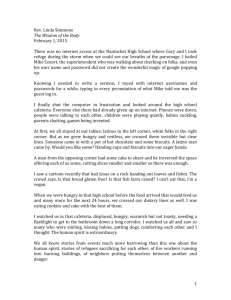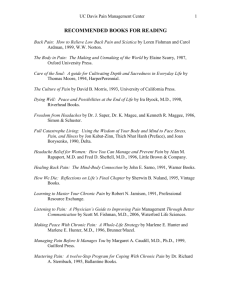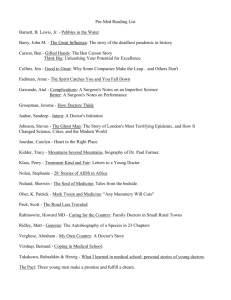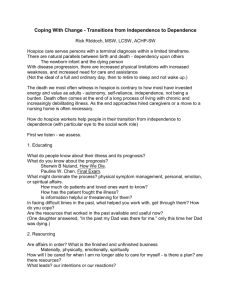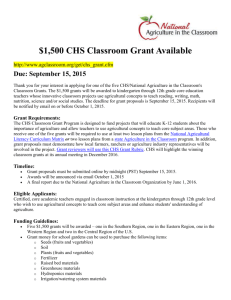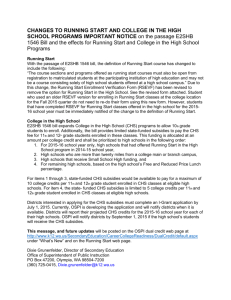Syllabus - School of History and Sociology
advertisement
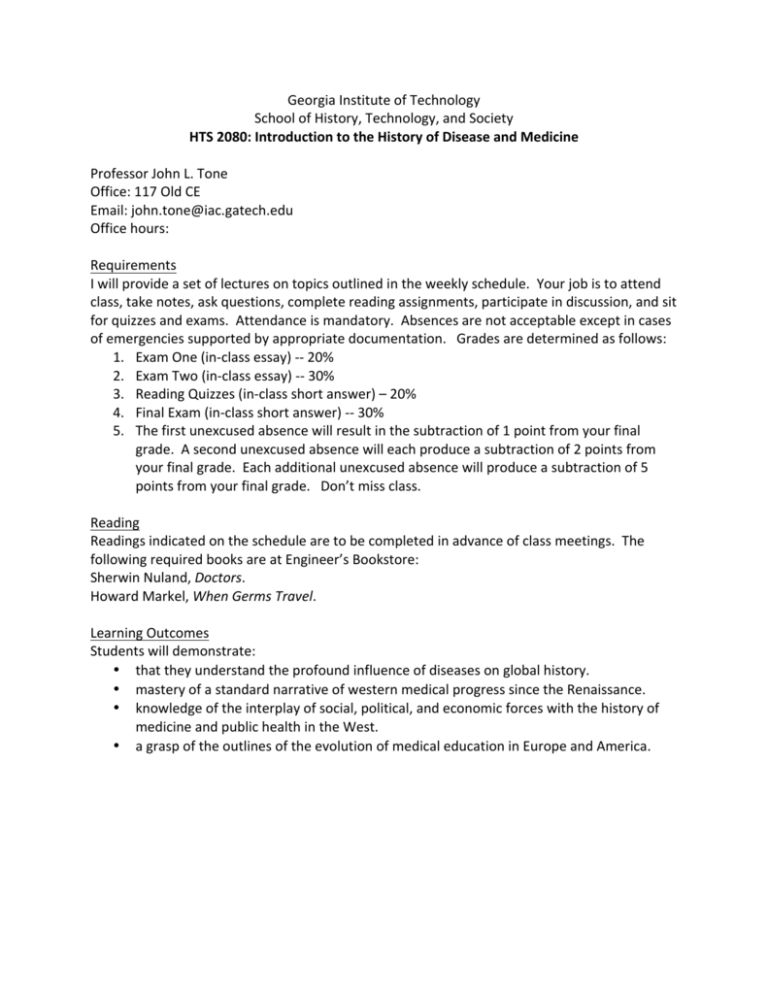
Georgia Institute of Technology School of History, Technology, and Society HTS 2080: Introduction to the History of Disease and Medicine Professor John L. Tone Office: 117 Old CE Email: john.tone@iac.gatech.edu Office hours: Requirements I will provide a set of lectures on topics outlined in the weekly schedule. Your job is to attend class, take notes, ask questions, complete reading assignments, participate in discussion, and sit for quizzes and exams. Attendance is mandatory. Absences are not acceptable except in cases of emergencies supported by appropriate documentation. Grades are determined as follows: 1. Exam One (in‐class essay) ‐‐ 20% 2. Exam Two (in‐class essay) ‐‐ 30% 3. Reading Quizzes (in‐class short answer) – 20% 4. Final Exam (in‐class short answer) ‐‐ 30% 5. The first unexcused absence will result in the subtraction of 1 point from your final grade. A second unexcused absence will each produce a subtraction of 2 points from your final grade. Each additional unexcused absence will produce a subtraction of 5 points from your final grade. Don’t miss class. Reading Readings indicated on the schedule are to be completed in advance of class meetings. The following required books are at Engineer’s Bookstore: Sherwin Nuland, Doctors. Howard Markel, When Germs Travel. Learning Outcomes Students will demonstrate: • that they understand the profound influence of diseases on global history. • mastery of a standard narrative of western medical progress since the Renaissance. • knowledge of the interplay of social, political, and economic forces with the history of medicine and public health in the West. • a grasp of the outlines of the evolution of medical education in Europe and America. Weekly Schedule Part One: Disease and History Week One 8/21: The Black Death, Origin and Identity No reading 8/23: The Impact of the Black Death Read: Boccaccio, Decameron, First Day, Introduction. Read up to note 49. At: http://www.stg.brown.edu/projects/decameron/engDecShowText.php?myID=d01intro&expan d=day01. Week Two 8/28: Smallpox and the Global Balance of Power Read: Alfred Crosby, “Conquistador y Pestilencia: The First New World Pandemic and the Fall of the Great Indian Empires,” The Hispanic American Historical Review 47 (August 1967): 321‐337. GT Library eJournals. 8/30: Variolation, Vaccination, and Eradication Read: Lady Mary Wortley Montagu, Letter. At: http://www.fordham.edu/halsall/mod/montagu‐smallpox.html. And: http://www.nlm.nih.gov/exhibition/smallpox/ Week Three 9/4: Potato Blight and Famine No reading 9/6: Influenza In‐class screening and discussion: Influenza, 1918. Read: Jeffery K. Taubenberger and David M. Morens, “1918 Influenza: the Mother of All Pandemics,” at: http://www.cdc.gov/ncidod/eid/vol12no01/05‐0979.htm Week Four 9/11: Revolutionary and Counterrevolutionary Diseases Read: J.R. McNeill, Mosquito Empires: Ecology and War in the Greater Caribbean, 1620‐1914, Cambridge, 2010, ch. 6, 195‐234, at: T‐Square. 9/13: Exam One Part Two: The Emergence of Western Medicine Week Five 9/18: Ancient Legacies ‐‐ Hippocrates and Galen Read: Nuland, chs. 1‐2. 9/20: The New Anatomy of Vesalius Read: Nuland, ch. 3. And: Andreas Vesalius, De Humani Corporis Fabrica, preface at: http://vesalius.northwestern.edu/flash.html (section beginning “To the Divine Charles V…” and ending with the date August 1, A.D. 1542) Week Six 9/25: Harvey and the Circulation of the Blood Read: William Harvey, De Motu Cordis, Frankfurt, 1628, at: http://www.fordham.edu/halsall/mod/1628harvey‐blood.html (chapters 2, 8, 9) And: Nuland, ch. 5 9/27: Microscopy View: http://www.youtube.com/watch?v=Q2ezDdKyRUc Week Seven 10/2: Enlightened Medicine Read: Nuland ch. 6. 10/4: French Revolution in Medicine Read: Nuland, ch. 8. Week Eight 10/9: Surgery Read: Nuland, chs. 4, 7. 10/11: Anesthesia Read: Nuland, ch. 10 Week Nine 10/18: Sanitation, Cholera, and the Birth of Public Health Read: Edwin Chadwick, “Inquiry into the Sanitary Conditions of the Labouring Population” at: http://www.victorianweb.org/history/chadwick2.html. And: John Snow, Cholera and the Water Supply, at: http://collections.nlm.nih.gov/muradora/objectView.action?pid=nlm:nlmuid‐101216228‐bk Week Ten 10/23: The Origin of Germ Theory Read: Nuland, ch. 9. 10/25: Pasteur, Koch, and Lister Nuland, ch. 12 Week Eleven 10/30: Exam Two Part Three: Contemporary Issues in Health and Medicine 11/1: Malaria Read: Jeanne Guillemin, "Choosing Scientific Patrimony: Sir Ronald Ross, Alphonse Laveran, and the Mosquito‐Vector Hypothesis for Malaria." Journal of the History of Medicine and Allied Sciences, 57, no. 4 (2002): 385‐409. GT Library eJournals. Week Twelve 11/6: Public Health in America ‐‐ Tuberculosis and Trachoma Read: Markel, chs. 1, 3. 11/8: Public Health in America ‐‐ Typhus and AIDS Read: Markel, chs. 4, 5. Week Thirteen 11/13: Medical Education in America Read: Nuland, ch. 13. And: The Flexner Report, introduction and part one, at: http://www.carnegiefoundation.org/sites/default/files/elibrary/Carnegie_Flexner_Report.pdf 11/15: Medical Education Today Read: Melvin Konner, Becoming a Doctor: A Journey of Initiation in Medical School, New York, Penguin, 1988, ch. 3. On T‐Square. Week Fourteen 11/20: Yellow Fever No reading. Week Fifteen 11/27: Being a Doctor Guest speaker: Dr. Steven Shore 11/29: Taking the MCATs Guest speaker: Jennifer Kimble, Director GT Pre‐Health Week Sixteen 12/4: AIDS and global health Guest speaker: Dr. from CDC 12/6: Review for exam FINAL EXAM is on 12/11, 2:50‐5:40
